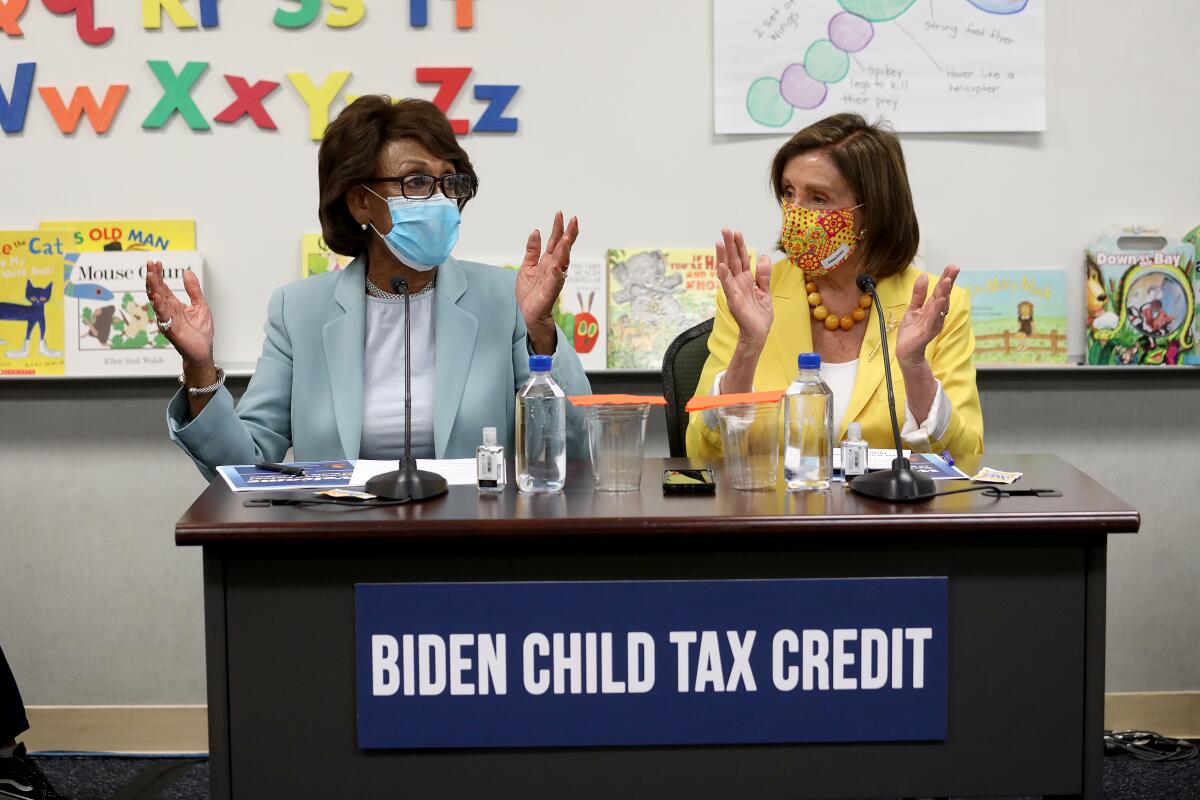Op-Ed: One huge cost of letting the expanded child tax credit die? Harm to developing brains

- Share via
Decades of research tell a clear and sobering story: Poverty is harmful to the developing brain.
The research demonstrates how experiencing the adversity of poverty in childhood places children at risk for later hardships. It also shows how modest investments to protect today’s children from this adversity can lower the roadblocks and burdens they may face as tomorrow’s adults.
The federal government has been actively making such investments since July, when monthly payments of up to $300 per child were made through the expanded child tax credit authorized by the American Rescue Plan, a COVID relief package. These payments reached 27 million children from families with taxable earnings too low to benefit from the annual tax refund provided by the previous child tax credit. The result has been an unprecedented reduction in childhood poverty and hunger.
Yet the expanded child tax credit is poised to become another Beltway failure. The provision expired at the end 2021. If it is not renewed or replaced with something equally supportive of struggling families, an estimated 9.9 million American children will fall back or sink deeper into poverty.
President Biden has proposed extending the policy for another year through his “Build Back Better” plan, but disagreement in Congress over the details of the extension threatens its future.
Studies in our lab and others’ have shown that living in poverty affects brain development, restricting the natural growth of the hippocampus and amygdala, two structures deep within the brain that support learning and guide emotional responses.
Research suggests that these structural effects may be long-lasting. Using brain scans, scientists have shown that adults in their 60s who were under economic strain in childhood tended to have smaller hippocampal structures than their peers who did not face this childhood adversity, irrespective of their financial circumstances later in life.
The brains of children are particularly vulnerable to environmental exposures because they are rapidly growing and changing, and highly influenced by experience. That is why children must be protected from public health hazards such as lead in drinking water and neurotoxins in baby food that increase their risk for neurological and emotional problems. But neuroscience research shows us that poverty can be toxic to children as well.
Although poverty may affect brain development through many routes — including poor nutrition and reduced cognitive stimulation — extreme and chronic physiological stress is clearly one of them. Studies that measure children’s cortisol levels suggest that chronic stress is the missing link connecting childhood poverty to reduced growth of the hippocampus. Research shows that programs such as the expanded child tax credit, which provide financial assistance directly to families in need, measurably reduce this harmful strain on children in poverty.
We already know too well that children’s exposure to poverty and food insecurity casts a long shadow, placing them at greater risk for mental illness and substance abuse later in life. A child growing up in poverty is 69% more likely to develop a mental illness than peers who have more financial security. Data from a study we have conducted for 17 years show how the effects of early-life poverty on brain development across childhood place children at greater risk for cognitive difficulties and problems with emotion regulation in adolescence.
These studies do not tell us about the capabilities or potential of individual children or adults who grew up amid the adversity of poverty. Instead, they tell us about risk to a population, about burdens that these children are more likely to face because we have failed to protect them.
Although many people will appreciate the value of protecting children from poverty’s harmful effects, most will see it as an unattainable goal. Thankfully, it is not.
Many other countries have mitigated the effects of childhood poverty with subsidized child care, universal preschool and child allowances, or monthly payment programs. With the expanded child tax credit, the U.S. briefly joined their ranks. U.S. Census Bureau data show that 59% of low-income families receiving this money spent it on food and 91% spent it on necessities, including utilities and rent, or on education.
Yet no check will be sent out this month. If Washington does not take swift action, we will lose the significant progress the country has made in reducing the damaging effect of poverty on American children.
Extending the expanded child tax credit or replacing it with a comparable child allowance would reduce the number of children in poverty by an estimated 40% and generate an estimated $800 billion in long-term savings and benefits to society, including improvements in health, higher educational attainment and earnings, and reduced use of child protective services and criminal justice services.
Protecting children from poverty is not only a moral imperative — it is also a wise investment in a brighter and more equitable future for us all.
Rebecca Schwarzlose is a cognitive neuroscientist in the department of psychiatry at Washington University School of Medicine and author of “Brainscapes: The Warped, Wondrous Maps Written in Your Brain — and How They Guide You.” Dr. Joan Luby is a professor of child psychiatry and a practicing child psychiatrist at Washington University School of Medicine.
More to Read
A cure for the common opinion
Get thought-provoking perspectives with our weekly newsletter.
You may occasionally receive promotional content from the Los Angeles Times.










